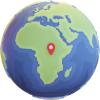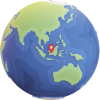Case studies are organised by region, with each region featuring links to the countries where the case studies are located.
Guatemala

A Mongabay report warns that organised crime is exerting unprecedented pressure on Guatemala's largest rainforest, the Maya Biosphere Reserve. The reserve has faced a wave of land invasions since the beginning on 2024, including in previously untouched areas such as Naachtún-Dos Lagunas Biotope. The invaders, often heavily armed, are backed by criminal groups seeking to exploit the government's agrarian reform policies to launder money through cattle ranching and drug trafficking across the Mexican border. As a result, the reserve is experiencing severe threats from deforestation, illegal livestock farming, and forest fires. In March 2024, a patrol discovered extensive markings and a road being cleared in Mirador National Park, signalling a planned large-scale invasion. Despite arrests and patrols, the encroachment persists. Mongabay also explains that the situation is exacerbated by the political transition with the inauguration of President Bernardo Arévalo, whose government supports rural and Indigenous communities. Proposed reforms to Guatemala's protected areas law could loosen restrictions on agriculture and livestock in the reserve in order to address longstanding issues related to land ownership, further endangering the area.
Keywords: Latin America, Guatemala, cattle, primary production, serious organised crime, agriculture, drug trafficking, illegal production, deforestation, money laundering
Sources: https://news.mongabay.com/2024/05/organized-crime-puts-unprecedented-pressure-on-guatemalas-largest-rainforest/
Guyana

According to AML Intelligence, U.S. government officials have issued several warnings to Exxon Mobil, urging them to avoid business dealings with Nazar Mohamed and his son, Azruddin, two prominent figures in the Guyanese mining industry. The Mohameds are suspected of money laundering, drug trafficking, and gold smuggling. Indeed, the Mohameds are under investigation by the DEA, FBI, and Homeland Security for allegedly smuggling Colombian cocaine and Venezuelan gold, and laundering money for drug traffickers, including sanctioned Russian nationals. Reports indicate that such illegal gold trafficking funds armed conflicts and supports criminal networks. Despite these allegations, the Mohameds assert that their trade relations with American companies are legitimate. U.S. authorities have warned Exxon of such suspicions, yet AML Intelligence reports that Exxon Mobil has proceeded with a $300 million deal to build an onshore logistics base with the Mohameds in April 2022. In response, the U.S. authorities are considering sanctions against the Mohameds, which could force Exxon to sever ties with them.
Keywords: Latin America, Guyana, mining, gold, money laundering, drug trafficking, gold trafficking, smuggling, serious organised crime, terrorist and coflict financing, sanctions evasion
Sources: https://www.amlintelligence.com/2023/07/special-report-exxon-mobil-repeatedly-warned-not-to-do-business-with-mining-magnates-suspected-of-money-laundering/

In the context of Exxon Mobil’s oil extraction operations in Guyana, the article uncovers significant challenges related to organised crime and drug trafficking. The influx of foreign workers and the rapid development brought about by the oil boom have attracted criminal networks seeking to exploit the newfound wealth. These networks are involved in drug trafficking, money laundering, and other illicit activities, complicating efforts to maintain law and order. The article highlights that the oil boom has strained local infrastructure and governance, making it difficult to address the growing influence of organised crime effectively. Corruption and weak enforcement of laws further exacerbate the problem, allowing criminal organisations to flourish. The situation demands robust international cooperation, stricter regulatory frameworks, and enhanced local policing to combat the pervasive influence of organized crime and mitigate the risks associated with drug trafficking in this rapidly evolving economic landscape.
Keywords: Latin America, Guyana, minerals, serious organised crime, drug trafficking, money laundering, rule of law, corruption and bribery
Source: https://www.reuters.com/investigates/special-report/exxon-mobil-guyana/
Honduras

Cattle can both themselves be laundered (if they are grazed on land that has been illegally cleared and converted to pasture) and used as a means of laundering criminal proceeds from other exploits, like drugs trafficking. In Brazil, cattle have been laundered to obscure their links to land clearing, when they are moved from ranches that have contributed to land conversion through “clean” ranches that have not resulted in recent forest loss.
In 2009, several Brazilian slaughterhouses signed the Terms of Adjustment of Conduct, an initiative of the Federal Prosecution Office and the Public Commitment on Cattle Ranching, and a voluntary protocol developed by Greenpeace, which precludes them from purchasing cattle reared on deforested land. However, a single cow might pass through up to 10 farms before it is slaughtered (from birth, through rearing and fattening). Any of these farms might be linked to illegal deforestation but many slaughterhouses assess links to deforestation only on the last farm a cow passes through - their direct supplier. As long as the last farm in the supply chain is from a “clean” ranch that is free from recent deforestation then slaughterhouses (and subsequent transporters and retailers, like supermarkets) are likely to mark them as deforestation-free, even if they have spent the majority of their life on and have passed through nine other ranches that have been converted from forested land. Indeed, data indicates that some ranchers own both “dirty” and “clean” ranches and launder cattle through their own properties. So long as one property is kept clean, they can continue to clear land for cattle grazing purposes on any number of other ranches.
Other investigations by Global Witness have found that ranchers have fraudulently edited the boundaries of their ranch once they have cleared areas of land, so that this land conversion is no longer included within the property’s scope and the ranch appears free from deforestation. This is alleged to be the case for the Fazenda Espora de Ouro II Ranch in Brazil’s Pará state, which Global Witness also found appears to be registered in the name of an individual who could not legally be its owner (based on assessment of a database of land titles and beneficiaries).
Cattle can also – and concurrently – be used as a means of laundering the proceeds of illicit activity. Drug traffickers – especially in Colombia (where the traceability of beef produce is particularly poor), Honduras, and Guatemala – are known to launder revenue from drugs by buying or grabbing land which they convert into pasture for cattle, which they also purchase with narcotrafficking proceeds. When the cattle are sold, profits are hard to trace back to the drug network and their illicit proceeds are effectively laundered. This practice, known as “narco-ranching”, is suspected of contributing up to 87% of deforestation in the Maya Biosphere Reserve, a large UNESCO heritage area of forest which covers over 2 million hectares of rainforest across northern Guatemala and borders other protected forests in Mexico and Belize. The Reserve is highly vulnerable to deforestation by crime groups due to its strategic location along a significant drug trafficking route up through Guatemala and Mexico leading to the US.
Cattle ranching in such areas also frequently serves to hide airstrips and production facilities used by traffickers to produce and transport drugs or other illicit products. Airstrips now pepper the Maya Biosphere reserve, which are used by planes coming in from Colombia and Venezuela with cocaine to be smuggled across the border into Mexico.
Keywords: Latin America, Honduras, primary production, money laundering, illegal deforestation, human trafficking, serious organised crime
Source: https://www.vox.com/science-and-health/2022/10/19/23403330/amazon-rainforest-deforestation-cattle-laundering

Organised crime groups engaging in drug trafficking and the illicit palm oil trade often exploit environmental reserves in Honduras. There is a rapid spread of oil palm plantations in the country, as palm oil is increasingly a high earning and low production export. Palm oil accounts for about 40% of global demand for vegetable oil as both food and fuel, with annual production having more than quadrupled since 1995. Palm oil, however, presents a serious threat to the biodiversity of the wetlands and the water quality of communities, among other environmental and health threats.
Making matters worse, illegal palm oil crops are increasingly being harvested by drug traffickers and other criminals in Honduras, with illegal plantations occurring across national parks and other environmental reserves. Investment in palm oil can provide criminals with a seemingly legitimate reason to use and control land in certain areas, as well as seemingly legitimate income that can be used to launder criminal proceeds.
Keywords: Latin America, Honduras, palm oil, primary production, serious organised crime, drug trafficking, illegal deforestation, money laundering
Source: https://www.theguardian.com/global-development/2023/nov/27/deadly-harvest-how-global-demand-for-palm-oil-is-fuelling-corruption-in-honduras
Mexico

Javier Duarte, former governor of Veracruz, Mexico, is implicated in a scheme where cattle ranching was used to launder money embezzled from public funds. An investigation by Animal Político found Duarte and his network purchased expensive cattle and large ranches, using them to clean hundreds of millions of pesos. This process allowed them to integrate illicit funds into the legitimate economy by taking advantage of the agricultural sector’s cash-based transactions and lax oversight.
Duarte, who governed from 2010 to 2016, had previously been convicted in 2018 for criminal association and money laundering, receiving a nine-year prison sentence. His case underscores the vulnerability of agriculture, especially cattle ranching, to financial crimes in Mexico. The revelations reflect ongoing difficulties in curbing corruption and organised crime, which increasingly infiltrate legitimate businesses to obscure the origins of illicit profits.
Keywords: Latin America, Mexico, cattle, primary production, money laundering, agriculture, organised crime, corruption and bribery
Source: https://insightcrime.org/news/governor-cattle-money-laundering-mexico/


The Environmental Crimes Financial Toolkit is developed by WWF and Themis, with support from the Climate Solutions Partnership (CSP). The CSP is a philanthropic collaboration between HSBC, WRI and WWF, with a global network of local partners, aiming at scaling up innovative nature-based solutions, and supporting the transition of the energy sector to renewables in Asia, by combining our resources, knowledge, and insight.


